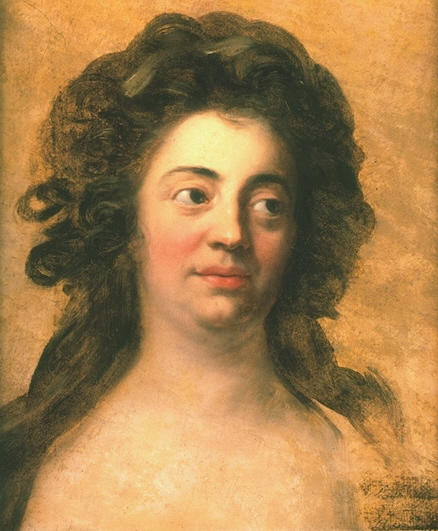<Back to Index>
- Microbiologist Anthonie Philips van Leeuwenhoek, 1632
- Novelist Dorothea von Schlegel, 1764
- Emperor of the Roman Empire Titus Flavius Domitianus, 51
PAGE SPONSOR

Dorothea von Schlegel (née Brendel Mendelssohn) (October 24, 1764 - August 3, 1839) was a German novelist and translator.
Dorothea von Schlegel was born in 1764 in Berlin. Oldest daughter of the philosopher Moses Mendelssohn, a leading figure in the German Enlightenment (Aufklärung). She married the merchant and banker Simon Veit in 1783. Their son, Philipp Veit, would later become part of a circle of German Christian painters called "the Nazarenes," who influenced the English painters in the Pre-Raphaelite Brotherhood. She met the poet and critic Friedrich von Schlegel in the salon of her friend Henriette Herz, after which she left her husband. They were divorced in 1799.
She obtained custody of her younger son, Philipp, and lived with him at the Ziegelstraße, which became a salon frequented by Tieck, Schelling, the Schlegel brothers, and Novalis.
Schlegel's novel "Lucinde" (1799) was seen as an account of their affair, causing a scandal in German literary circles. In 1801 her novel "Florentin" was published anonymously by Schlegel. They lived in Paris from 1802 until 1804, and after her divorce they married as Protestants. In 1807 she translated "Corinne" by Madame de Staël from the French.
In 1808, Friedrich and Dorothea converted to Catholicism. (She may have adopted the name "Dorothea" from a 17th century Dorothea von Schlegel who composed Catholic hymns). They continued to visit the salons of Rahel Levin and Henriette Herz, as well as the constellation which surrounded Madame de Staël.
Friedrich died in 1829, after which she moved to Frankfurt am Main.
There, she lived with her son Philipp (also a convert to a medieval
style of Catholicism) until her death in 1839. As the daughter of the greatest Jewish philosopher of the Enlightenment - Moses Mendelssohn - (of equal stature with Immanuel Kant, and translator of John Locke and Alexander Pope, as well as Hebrew scriptures
into German), Dorothea was surrounded throughout her life by the
leading poets, critics, musicians, novelists, and philosophers of
Europe. Gotthold Ephraim Lessing was her father's closest friend and colleague, and the Emancipation and secularization of
the Jews and Jewish culture was a direct outcome of their work.
(Mendelssohn was the model for Nathan der Weise in Lessing's play of
the same name.) Friedrich the Great was Lessing's patron, and he extended royal protection and sponsorship to Mendelssohn, as well. Dorothea's brother, Joseph, was a friend and sponsor of Alexander von Humboldt, the great naturalist and ethnologist. Felix Mendelssohn, the composer, and his sister Fanny Mendelssohn, also a gifted musician, were her nephew and niece. Most of her work, letters, biographies, etc. seem to be available only in German. And there, with the legacy of the Holocaust,
she would seem to have an ambiguous status. The emancipation of
European Jewry, in which she and her family played a significant role,
became the main target of the Third Reich and its Nuremberg Laws. For
some Jews, she may be a less than admirable figure as well, having left
her Jewish husband, violated her divorce settlement, and converted
first to Protestantism, and finally to Catholicism. Most of her later
friends were Christians, assimilated or intermarried Jews (like Rahel
Levin), or secular Deists and materialists. Her association with
Germaine de Staël was obviously of the greatest importance, since
Mme de Staël was also the patron and literary companion of
Dorothea's second husband, Friedrich Schlegel. The daughter of Jacques Necker, Louis XVI's finance minister, de Staël witnessed the collapse of the Bourbons and the French Revolution.
It was probably
through de Staël's husband, a Swedish Count, that the Schlegel's
were granted a title of nobility in the Swedish court.